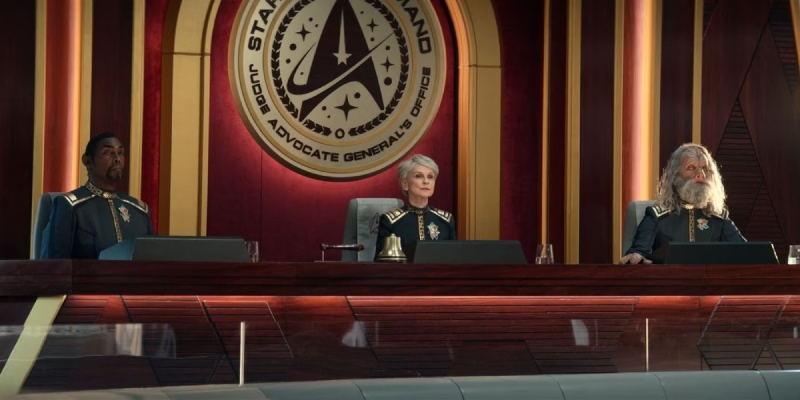
The Prequel Film “Star Trek: Strange New Worlds” Reaches Its Expressive Limit
Prequels, particularly for notable properties, are restraints which limit their own narrating prospects. The fact that the audience frequently knows where these characters (and storylines) will end up hinders dramatic license. Additionally, viewers who are likely aware that what’s happening now contradicts what they’ve already seen can be jarred by any violence to the existing narrative. Strange New Worlds has successfully dealt with this problem up until this point, benefiting from its well-known conclusion.
“A Nature of Benevolence” deftly played with the reality Pike will ultimately get his close deadly portion of radiation. The episode made the shocking idea of his personality both an advantage and a weight, making it convincing simultaneously. In contrast, “Ad Astra per Aspera” demonstrates the limits of what prequels can say and do by criticizing them. Long-term viewers are aware that even though it depicts a world that is hopeful for change, optimism is misplaced.
This shouldn’t imply that the episode is terrible, in light of the fact that it’s another without hesitation told, if lightweight, story in a series that realizes it works in that register. Since they are both prone to melodramatic exploration of The Big Issues(TM), it helps that Star Trek wears the courtroom drama tropes so well. This subtext is sufficiently broad to accommodate a wide range of interpretations without excessive stretching. Yet again and there’s something like one really interesting satire second where we, perceive the amount more fun Spock is the point at which he’s played as a blockhead.
Despite Starfleet’s prohibition against genetic modification, Number One is getting ready to stand trial for entering Starfleet fraudulently. She’s pondering her life as a youngster, where her folks stress over taking her to a specialist and thusly uncovering her status. Number One balks when Captain Batel (Melanie Scrofano), who for some reason is now a member of Starfleet’s legal corps, offers a plea bargain that includes a dishonorable discharge.
Pike jets off to meet Neera (Yetide Badaki), an Illyrian lawyer and Number One’s former friend who has so far refused their requests for assistance. Pike refuses to passively accept his friend’s fate. She is convinced to sign up by his refusal to take no for an answer and the lure of a high-profile case with which to confront the Federation. What follows is the typical court show, zeroing in on what provoked Number One to join to an association that can’t stand her.
We learn that the apparent diversity of Starfleet’s crews sparked Number One’s decision to join. In any case, that isn’t sufficient to win until Neera tracks down the inconsistency between the Alliance’s fine words, its objectives, and its regulations. It’s an unpretentious, pointed, evaluate of what Darren Franich named the “California liberal oddity” in his paper on Star Journey: Uprising. ( Furthermore, Star Journey isn’t anything in the event that not an animal of Californian qualities.) He says that those people might want “everyone to live comfortably, but would secretly prefer that most people live comfortably somewhere else.” He says that this may be the case.
Be that as it may, the court views as Number One not blameworthy, and she’s permitted to get back to well-trained on the Endeavor. At the cheerful ever after gathering in the carrier room, Neera expresses that while the case impacted only one individual, it’s a “begin.” She adds that Main’s perceivability as an Illyrian (second) in charge of a starship will assist with turning individuals’ hearts and psyches toward her objective. It’s a confident closure, and one that recommends Number One’s story will launch a course of progress and development that will ultimately see these biases and lawful blocks disappear.
The issue with that completion, and how ideally it’s depicted, is that long-term Star Journey watchers realize it doesn’t work out. Any hearts and psyches that would be changed in this cycle would be a minority given that – starting here in Journey history – things won’t change. As affirmations of the status quo, we have “Space Seed,” “The Wrath of Khan,” “Dr. Bashir, I Presume,” and “Statistical Probabilities” in chronological order. In the narrative of Star Trek, genetically modified individuals continue to be ineligible to serve in the primary military, scientific, and exploratory branch.
It loans the episode a disastrous quality that isn’t reflected in its show, yet one that adds a layer of profundity for committed watchers. Maybe the thing I’m depicting as a constraint of its narrating is actually a brilliant critique on the fact that twisting the bend of history toward justice is so difficult. Actually, I think I’ve just talked myself out of it; Dana Horgan and Valerie Weiss have done a wonderful and insightful job of exploring this topic; congratulations!
Disclaimer: The views, suggestions, and opinions expressed here are the sole responsibility of the experts. No Research Raptor journalist was involved in the writing and production of this article.